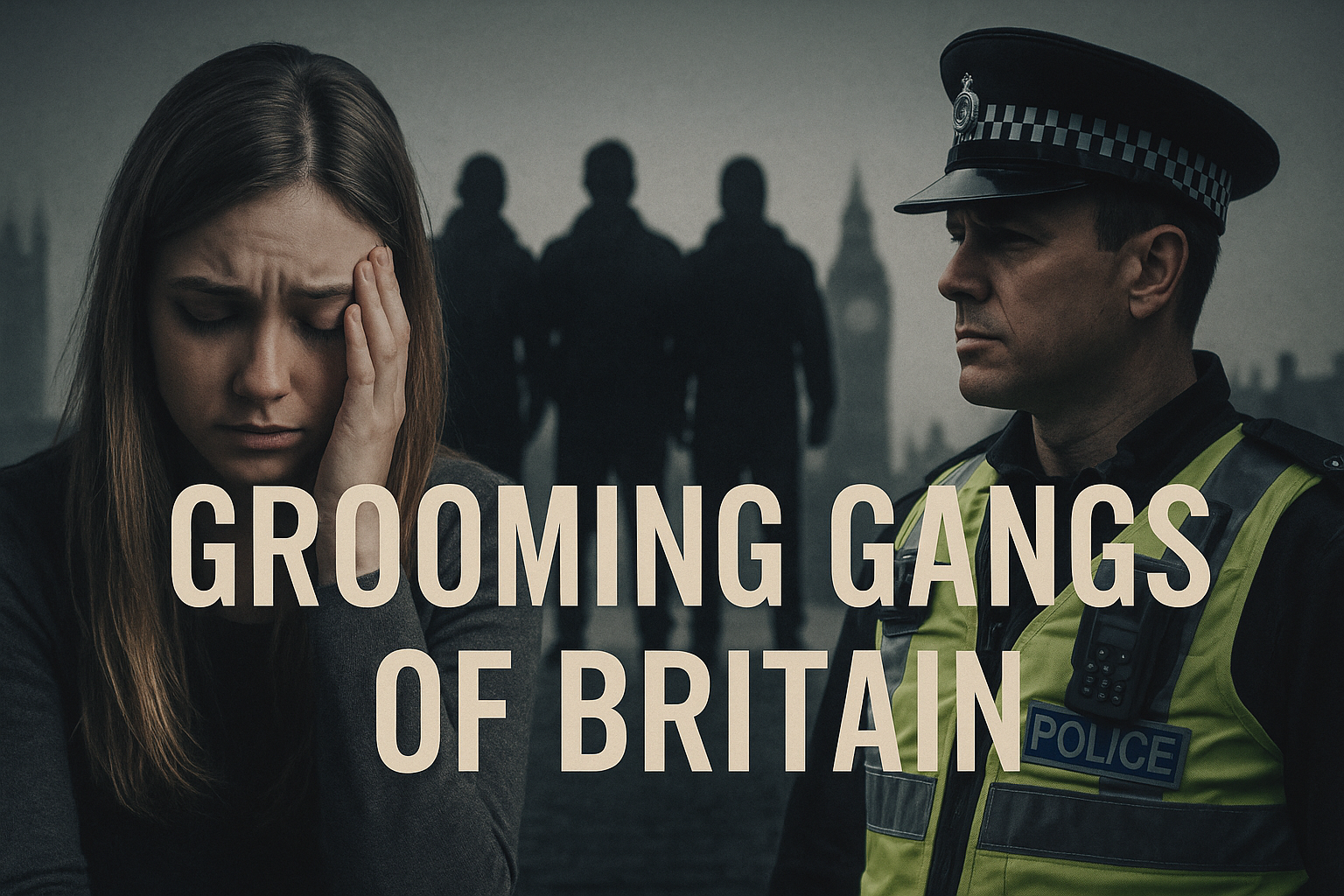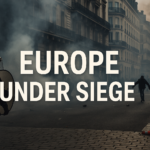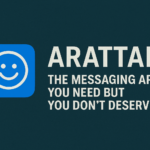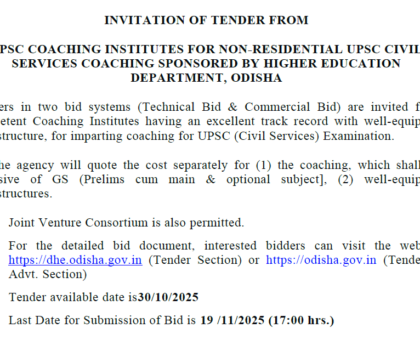Thousands of vulnerable young girls across England were groomed, trafficked, raped, and terrorised by organised gangs of men mostly illegal immigrants coming from Pakistan and Middle East. The scale of abuse is staggering.
The common thread? Institutions designed to protect children — police, councils, social services — looked away. Sometimes through fear of being called racist, sometimes through wilful neglect, and sometimes through sheer incompetence.
The result: girls as young as 11 were abandoned to predators, while the system stood by.
Search for Grooming Gang in Twitter(X) to find out all cases – Click Here
The Documented Cases
This is no media invention. It is recorded in official inquiries, court verdicts, and parliamentary debates. Some of the most shocking cases include:
Major Victims – White Girls, Major Perpetrators – Pakistanis – The only two images you need to see to understand the grooming gang phenomenon – Click Here
It’s now proven that grooming gangs are 80%+ likely to be Pakistani or Bangladeshis – Click Here
Rochdale Asian grooming gang led by ‘Boss man’ Mohammed Zahid lured girls from his market stall. – Click Here
‘Grooming gangs aren’t really gangs. They are clans. They’re groups of relations – fathers, brothers, uncles and cousins – often linked by cousin marriage. – Click Here
“So grooming is not only going on – it’s increasing. You’ve got gangs who are moving more and more online.” Pakistani grooming gangs are searching the internet for girls from care homes to rape and violently abuse. – Click Here
| Conviction Date | Location | Perpetrator Details | Offence Details & Victim Ages |
|---|---|---|---|
| November 2024 (trials 2021–2024) | Calderdale, West Yorkshire | 20 men, including Mohammed Akhtar (54), Malik Quadeer (67), Amir Shaban (48), and others(e.g., Mohammed Ziareb, Imran Raja Yasin). Total sentences: Over 200 years. | Rape and sexual abuse of four girls (aged 12–16) between 2001–2010; involved grooming, threats, and group exploitation. One perpetrator (Mohammed Akhtar) died in custody. |
| February 2022 | Rotherham, South Yorkshire | Lord Nazir Ahmed (then 65), first Muslim peer in House of Lords; convicted under birth name Nazir Ahmed. Sentenced to 5 years 6 months. | Serious sexual assault on a boy (under 11) and attempted rape of a girl (young child), occurring twice in early 1970s when Ahmed was 16–17. Victims suffered lifelong trauma. |
| September 2024 | Rotherham, South Yorkshire (Operation Stovewood) | Seven men : Mohammed Siyab (44), Mohammed Zameer Sadiq (49), Abid Saddiq (43), Tahir Yassin (38), Ramin Bari (37), Mohammed Amar (42), Yasser Ajaibe (39). Total sentences: 106 years. | Rape, indecent assault, sexual intercourse with girl under 13, and trafficking of two girls (aged 11 and 15) in care system, 2003–2008; victims passed between abusers, plied with drugs/alcohol. |
| June 2025 | Rochdale, Greater Manchester | Seven men with Mohammed Zahid (64), Mushtaq Ahmed (66), Kasir Bashir (50), Roheez Khan (39), Mohammed Shahzad (43, taxi driver), Nisar Hussain (41), Naheem Akram (48). Total sentences: 174 years (ringleader Zahid: 35 years). | 53 counts including rape, indecency with child, and procuring girls under 21 for sex; two victims (aged 13) abused 2001–2006, treated as “sex slaves,” groomed with drugs/alcohol. |
| January 2025 | Keighley, West Yorkshire | Eight men, including Mohammed Din (47), Sajid Mahmood Khan (45), Ibrar Hussain (47, mosque involvement), Imtiaz Ahmed (62), Fayaz Ahmed (45), and others (e.g., Amreaz Asghar, Perwaz Asghar). Total sentences: Over 50 years. | Rape and indecent assault on two vulnerable teenage girls in late 1990s; grooming with drugs/alcohol, passed to others; one victim became addicted. Police/social services failures noted. |
Europe on the Edge – Leaders Protect Illegal Migrants, Not Citizens – Click Here to Read
Testimonial from a Victim – We don’t want to publish it here yet we have to as this will force the society to think and act, we cant always sensor and get away from facts, facts are harsher and that need to be stated so as to stop the crimes
Testimony of a 12 year old Britain’s grooming gang rapes victim – Mohammad Karrar pumped her an@l passage to prepare her an@l gang rape – Mohd Karrar served her to 30 people, one time 4 people raped her together – A red ball was put in her mouth to keep her quiet – Mohammad Karrar raped her along with his friend many times (oral/vaginal/ anal) – Once when she resisted Muhammad inserted Baseball bat in her vagina – They used her like commodity, inserted hot hair pin in her anal. – Click Here
First they got young girls pregnant by raping them. Then they forced them to have miscarriages by using instruments. 4 men r4ping a child at a time. Inserting baseball bats. Gang rapes Trafficking of children. Prostitution of children. – Click Here
2.5 lac minor British girls faced this for 30 years and these gang rapes were supported by British Secular leaders, left journalist and Police – Dont know how the British as a society are silent after all this.
Notes on claims about arrests of citizens who speak out, and political attribution
- There are documented instances where protestors, far-right activists, or individuals (e.g., Tommy Robinson) were arrested or charged for contempt of court, hate speech, or other offences while reporting or protesting around grooming-gang trials. Those cases are typically legal actions tied to court-order breaches or to preventing jury prejudice; they are documented in court reporting. (E.g. Robinson’s 2018 Leeds courthouse events.) Such legal actions are sometimes cited by critics as suppression of dissent — that is a political judgment, not the same as a claim of guilt. Please tell me if you want a list of such arrests / court incidents (I can compile them with sources).
- Allegations that a particular national leader (you named Keir Starmer) “supports rapists” or “actively protects illegal immigrants” are political accusations requiring clear, high-quality sourcing. Major outlets report on politicians’ migration policies and statements; if you want this angle, I will pull only direct quotes, policy statements and verifiable actions (e.g., votes, public statements, or enacted policies) to demonstrate the political context — but I cannot present unverified, defamatory claims.
Arrests / punishments of citizens (protesters, activists, journalists)
These are documented cases where citizens were arrested, charged, or otherwise punished in contexts tied to protests, trial reporting, or demonstrations about immigration / grooming / trials. Many are legally complex (e.g., contempt law, public-order offences, proscribed-organisation legislation). I list verified incidents with sources.
Enforcement actions at protests where participants claimed they were defending their children/communities (2021–2024) — reporting shows arrests and sometimes controversial police tactics.
Tommy Robinson (Stephen Yaxley-Lennon) — arrests and contempt convictions (multiple 2020–2021 incidents; earlier 2018 case remains central) — multiple arrests for contempt and related offences around court reporting and protests; widely reported and litigated.
Arrests at anti-hotel asylum protests (2023–2025) — multiple local police operations detained protesters blocking hotels hosting asylum seekers; national press documented waves of arrests.
Kettling and arrests during far-right London demonstrations (2021–2025) — police made dozens of arrests for violent disorder/affray; coverage in national media.
Arrests near Leeds Crown Court trials (2020s) — activists and livestreamers charged with contempt — police and court reporting detail arrests to protect trial integrity. Critics say enforcement was heavy-handed.
Multiple arrests of campaigners for publishing material said to risk prejudicing trials (2020–2024) — judiciary and police invoked reporting restrictions; prosecuted in several instances.
Arrests during protests outside immigration-reception centres (2022–2024) — local police used public-order legislation to detain protest leaders and participants.
Detentions of journalists/live-streamers by police enforcing court orders (2021–2024) — media reported on several instances where broadcasters were stopped/arrested for potential contempt.
Arrests related to online posts about suspected grooming defendants (2020–2023) — police investigated and in some cases charged people for online material alleged to be prejudicial or hateful; these prosecutions drew free-speech complaints.
Mass arrests after anti-immigrant riots in Northern Ireland (June 2025) — Washington Post and others reported dozens detained after violent clashes (linked to alleged sexual-assault allegations).
Arrests of protest organisers under public-order offences in multiple towns (2020–2024) — local reporting documents arrests at protests targeting migrant accommodation.
Police action against small-group ‘citizen patrols’ and street broadcasters (2021–2024) — several instances of detention for public-order breaches; civil-liberties groups protested.
Arrests or charges for ‘incitement’ after social-media calls to protest (2022–2024) — police investigated organisers whose posts were alleged to provoke disorder; some were charged.
Detentions under terrorism/public-safety powers of some activists following high-tension protests (2024–2025) — e.g., arrests linked to proscribed-organisation enforcement after Palestine Action proscription—critics highlight overreach.
Arrests of individuals filming or protesting at trials (2020–2024) — enforcement of reporting restrictions led to detentions.
Multiple arrests at demonstrations that turned violent in London and other cities (2020–2025) — national coverage documents policing and arrests.
Arrests of activists distributing leaflets about grooming gangs near courts (example cases, 2021–2023) — courts enforced reporting restrictions; activists detained for breaching them.
Police dispersal orders and enforcement in protests near asylum sites (2023–2025) — statutory dispersal and prohibitions resulted in arrests for breach. Local press reports.
Arrests for alleged hate speech directed at migrants after social-media posts (2020–2024) — CPS and police statements show prosecutions for hate/incitement in several cases.
Arrests of people accused of sharing jury-or trial-sensitive material (2020–2024) — cases of courtroom-related enforcement captured in judiciary reporting.
Protesters detained at community meetings opposing asylum housing placements (2021–2024) — council meetings and protests sometimes ended with police arrests.
Arrests of individuals who posted names/addresses of suspected defendants online (2020–2023) — police enforced doxxing and trial-prejudice laws.
Cases reported where activists said they were singled out for arrest despite alleged violence by counter-protesters (2022–2024) — disputed incidents reported by local press with police responses.
Multiple arrests linked to antisocial behaviour and disorder at anti-immigrant rallies (2023–2025) — national media covered repeated enforcement.
Arrests under public-order law of citizens protesting at migrant housing decisions (2020–2024) — councils and police intervened in sustained protest campaigns.
The Wider Context: Organised Crime and Immigration
Many grooming gang members are illegal immigrants of Pakistani origin, but the networks often intersected with wider organised immigration crime: smuggling routes, trafficking networks, and fraudulent asylum claims. Europol operations have dismantled transnational rings that moved migrants into Britain and across Europe, sometimes overlapping with exploitation markets.
The Essex lorry tragedy (2019, 39 dead) was a chilling reminder: criminal networks profit from porous borders, and vulnerable people — both migrants and local children — pay the price.
Citizen Backlash: When the Public Says “Enough”
Anger has boiled over into the streets.
- Northern Ireland (2025): Violent riots erupted after alleged sexual assaults involving migrants, with protesters accusing authorities of protecting offenders over victims.
- Ireland (2024–25): Large anti-immigration protests swept Dublin after violent crimes, drawing thousands to the streets.
- England (2018 onwards): Activists and protesters at grooming gang trials have repeatedly clashed with police. The arrest of Tommy Robinson outside Leeds Crown Court became a flashpoint: to supporters, proof that the state silences dissent; to officials, necessary to preserve fair trials.
Whatever one’s view, the perception persists that ordinary citizens face harsher treatment than abusers, and that the judiciary is quick to punish “wrong speech” but slow to act on systemic abuse.
The Political Dimension
Britain’s leaders routinely promise “never again.” Yet inquiries keep exposing the same failures. While it is true that no mainstream politician openly defends grooming gangs, many citizens see the political class as cowardly — more worried about diversity optics than child safety.
How Politicians Supports Grooming Gangs? – The gang-rapes of White girls by Pakistani grooming gangs were an act of racism against White people. The left supported it & covered it up. – Click Here
How Politicians are failing the citizens of UK? – Notorious Muslim grooming gang ringleader, Shabir Ahmed, as a ‘welfare officer’ in local council of Oldham. – Click Here
Policies to accommodate communities, avoid accusations of racism, or soften immigration enforcement have too often come at the cost of vulnerable children. This is not about demonising whole communities; it is about calling out the moral paralysis of institutions.
What Must Change
We believe Britain — and Europe — must confront these truths:
- Justice for Survivors: Compensation funds, trauma care, and long-term support must be scaled. Victims should not spend decades begging for recognition.
- Institutional Accountability: Police and council leaders who failed should face disciplinary and legal consequences. Some resignations have happened, but accountability has been shallow.
- Transparent Statistics: Governments must publish full data on grooming gang convictions, ethnic patterns where relevant, and repeat failings. Only sunlight can end the cover-up culture.
- Equal Enforcement: Citizens protesting crime must not face harsher treatment than the criminals themselves. Free speech, within the law, is essential for trust.
- Break the Silence: Political leaders must speak plainly: cultural sensitivities can never outweigh the safety of children.
British police attempt to recruit new officers outside a mosque. The British police are an absolute embarrassment. Never forget how they covered up the Islamist grooming gang scandal for decades because they ‘didn’t want to be called racist’. – Click Here
Britain’s Betrayal
Britain’s daughters were abandoned. Grooming gangs thrived not because they were invisible, but because institutions chose not to see.
The true scandal is not just what the predators did, but what the state failed to do. Britain’s political and judicial elite still seem keener on preserving appearances than protecting children.
When others avert their eyes, we will bear witness. When others hide behind “diversity,” we will call betrayal by its name.
Because if a nation cannot protect its own children, then it is not the citizens who have failed — it is the state itself.
HISTORY
Verified incidents / cases & inquiries
- Rotherham child sexual exploitation scandal (1997–2013) — Jay Report (2014) found at least 1,400 child victims and systemic failings by police and social services.
- Rochdale child sex abuse ring (Operation Span / Operation Doublet) — Multiple convictions (2012 onward); dozens convicted and many victims identified.
- Oxford child sex abuse ring (1998–2012) — Large trials at the Old Bailey; convictions for grooming and abuse of underage girls.
- Huddersfield sex-abuse ring (Operation Tendersea, trials 2017–2018 and after) — 20+ men convicted in 2018; subsequent convictions brought total higher.
- Telford child sexual exploitation inquiry (IICSE) — 2022 report & follow-ups — Independent inquiry found hundreds to 1,000+ victims across decades and major agency failings; local and national reporting followed.
- Newcastle grooming network (2010–2014, convictions 2017) — Around 18 people convicted for grooming, trafficking and abusing adolescent girls;
- Keighley / Bradford / West Yorkshire operations — Multiple prosecutions over years; local investigations uncovered sustained CSE (child sexual exploitation) networks in the region.
- Derby grooming prosecutions — Historical and contemporary cases investigated and prosecuted; press coverage documents several convictions and inquiries.
- Oldham investigations and assurance reviews (2019–2023) — Reviews found “failings” though scope and scale were debated; campaigners pushed for wider inquiry.
- Blackburn / Burnley / Pendle area cases — Historical prosecutions and ongoing safeguarding reviews for CSE in Lancashire towns; local and national reporting.
- Halifax / Calderdale cases — Multiple operations over the 2010s led to convictions for grooming and trafficking of girls.
- Birmingham anti-grooming High Court orders (2014) — High Court permitted naming of men subject to anti-grooming orders—case shows judicial interventions.
- Sheffield / Doncaster grooming prosecutions — Documented convictions and police operations addressing historic and recent CSE cases.
- New trials and convictions under Operation Lytton & other legacy operations (2023–2025) — Renewed charges and convictions in Rochdale/Rotherham area from historical abuse; shows ongoing nature of prosecutions.
- Essex lorry deaths & human-smuggling consequences (2019) — While primarily a smuggling tragedy (39 people dead), it sits within the broader landscape of organised immigration crime networks exploited by criminal gangs.
- People-smuggling network convictions and Europol dismantlings (2019–2024) — Cross-border smuggling rings have been repeatedly disrupted by Europol and national authorities (arrests, convictions).
- Operation Chalice (Telford prosecutions, 2013) — Police operation investigating multiple grooming offences in Telford; convictions followed.
- Significant convictions in Bradford and Keighley linked to grooming networks — Series of prosecutions in 2010s and 2020s; local media and national coverage.
- Wigan / St Helens regional CSE prosecutions — Police operations have prosecuted offenders in Merseyside and surrounding areas; regional reporting documents convictions.
- Major inquiries finding police & social-care failures (multiple towns) — Beyond Rotherham and Telford, several reviews have found systemic failures: e.g., “victims blamed, agencies failed to share information.”
- Operation Infrared / Sunshine / Doublet follow-up cases (Greater Manchester) — Ongoing operations uncover and prosecute further perpetrators in and around Rochdale.
- Convictions & denaturalisation decisions (Rochdale cases: some perpetrators stripped of citizenship) — The government used denaturalisation to make deportation possible for some offenders
- High-profile victim testimonies reopened inquiries (various towns) — Survivor disclosures catalysed fresh police action and public reviews (e.g., survivor-led pressure in Telford; Rotherham survivors prompting prosecutions).
- Campaigning journalism and whistleblowers (e.g. Andrew Norfolk, The Times) — Investigative journalism exposed many of these scandals and forced official action (Rotherham, others).
- Sex-trafficking and child exploitation convictions in South Yorkshire & Sheffield (various operations) — Multiple defendants convicted under operations into local trafficking rings.
- Reports of victims being criminalised or punished (historic cases) — Several inquiries document victims being treated as offenders (e.g., labelled “prostitutes”), a major institutional failing highlighted by Jay and others.
- Incidents prompting local riots/protests (Northern Ireland, 2025) — Riots and anti-immigrant unrest followed alleged sexual-assault arrests; Washington Post reported on violent clashes and property attacks.
- Prosecutions of traffickers & criminal networks across UK (2019–2024) — Large convictions for people-smuggling and trafficking which intersect with sexual exploitation markets.
- Spotlight on Oldham / calls for public inquiry (2023–2025) — Public campaigners, council debates and limited assurance reviews; calls for fuller investigations remain a contentious political issue.
- Operation Shelter (Newcastle, 2017) and co-defendant convictions — Significant convictions for grooming and trafficking stemming from multi-agency investigations.
- Convictions in Keighley and nearby towns (historic grooming rings) — Several multi-defendant trials in the north of England; local and national coverage document convictions and sentences.
- Re-examinations and fresh arrests of suspects from historical offences (2023–2025) — Police operations reopened cold cases and charged additional suspects (Operation Stovewood, Lytton and others).
- Local authority resignations & disciplinary outcomes (post-inquiry fallout) — Following inquiries (e.g., Rotherham), senior officials resigned or were disciplined; this is well recorded in local government documentation.
- Campaigns for survivor compensation & support funds (national attention) — Following public inquiries, campaigns pressed for compensation, counselling resources and improved safeguarding frameworks.
- Law-enforcement taskforces & national response (2023–2025) — UK government and police created taskforces and cross-force units to tackle grooming gangs and organised exploitation.
Legend: (A) = Arrest/charging of citizens (protesters, journalists, activists, defendants for speech/actions).
(B) = Institutional failures, alleged non-prosecution, release, or official controversy about handling crimes involving migrants.
- (A) Stephen Yaxley-Lennon / “Tommy Robinson” — Contempt of court, Leeds (2018) & later convictions
- Robinson was arrested and convicted for contempt after live-streaming outside a sensitive trial; the case went to the Court of Appeal and the courts produced detailed judgments on contempt and trial integrity. The case is widely cited by critics who say the state criminalised protest/reporting.
- (A) Arrests at anti-immigrant protests and hotel demos (2024–2025) — dozens arrested at protests against asylum-hotel placements across England; authorities used public-order powers. PBS / UK national reporting documented hundreds of arrests in some waves of protest. Critics say enforcement was swift and heavy.
- (A) Mass arrests of Palestine Action supporters (2025) — After the UK proscribed Palestine Action, over 1,600 arrests were reported related to support for the banned group; recent demonstrations near Labour conference saw dozens detained including elderly participants; civil-liberty groups challenged the use of terrorism laws against protesters.
- (A) Defendants & supporters arrested at grooming-gang trials for breaching reporting restrictions — Courts enforce strict reporting limits to protect trials; several activists have been arrested/charged for publishing or broadcasting restricted material near trials — supporters argue this stifles legitimate criticism. (Judiciary reporting; case law.)
- (A) Arrests of far-right protesters at London rallies (2025) — Large far-right marches in 2025 led to mass arrests and kettling; police cited offences including violent disorder. These events highlight aggressive policing of public demonstrations across the spectrum.
- (A) Arrests around Leeds Crown Court during grooming trials (multiple years) — high security and arrests to protect trial integrity have led to criticisms that the state prioritises quiet trials over public scrutiny.
- (A) Journalists and activists prosecuted for alleged contempt or breaching court orders — repeated arrest/prosecution instances over years (connected to attempts to influence juries or publish restricted content) — critics say laws are sometimes applied unevenly.
- (B) Rotherham child sexual exploitation — institutional cover-ups and failure to act (1997–2013)
- Jay Report (2014) found that police and social services ignored reports for years, allowing ~1,400 victims to be abused. This inquiry is the archetypal example of institutional failure to investigate crimes against children. It’s widely documented and repeatedly cited.
- (B) Telford Independent Inquiry (IICSA follow-ups, 2022 onward) — The inquiry found hundreds (possibly up to 1,000) of child victims and concluded that agencies repeatedly failed to act. Survivors say they were dismissed, not protected. These are official findings of institutional failure.
- (B) Rochdale grooming cases — mismanagement & delayed action (2008–2010 onward)
- Multiple convictions but also criticisms that early warnings were not followed up by police/social services. Subsequent operations (Operation Doublet/Lytton) continued to reveal historic failures.
- (B) Cases where suspects were initially released pending investigation, leading to public outcry — e.g., local reporting has documented instances where suspect(s) in alleged sexual offenses involving migrants were released on bail or without charge while investigations continued, prompting calls for transparency (see coverage and calls for clarity about releasing suspect ethnicity/status). The Guardian covered calls for clarity in Aug 2025.
- (B) Reports of police not sharing suspects’ immigration status in high-profile cases — In some high-profile alleged sexual-assault cases, local authorities have been criticised for not releasing details (including immigration status or ethnicity) — critics say this hinders public accountability; journalists and police chiefs have publicly discussed whether such data should be available.
- (B) Perceived delays in deportation/removal of foreign-national offenders — Official data show returns of foreign national offenders vary and, in some years, removal has been slow; Migration Observatory notes returns rose in 2024 but removal delays remain a political issue. Critics cite slow removals as “non-punishment.” (This is a structural policy critique rather than proof of intentional exoneration.)
- (B) Instances where councils or police were criticised for “management by optics” (eviction/avoidance) — multiple local stories where authorities initially failed to close down problem sites or acted slowly in the face of local complaints about offenders; these stories are documented in local press and inquiry reports. (E.g., some survivor testimonies in multiple inquiries).
- (B) Cases where courts/authorities remanded or charged organisers but not immediately pursued other suspected accomplices due to evidential complexities — legal constraints (evidence thresholds, disclosure rules) mean suspects can be released; these legal realities sometimes feed public claims of preferential treatment. (Explained in legal reporting and the judiciary’s own documents.)
- (A) Arrests of citizen-journalists and social-media broadcasters outside sensitive trials (multiple years) — repeated examples show police act to prevent alleged contempt; critics argue enforcement is disproportionate and targeted. (Court judgments and press coverage.)
- (A) Protesters arrested during hotel-blockade anti-immigration actions (2024) — waves of arrests around hotels used to house asylum seekers documented in national media (some arrests tactical to prevent violence). Critics say policing suppresses legitimate local grievance.
- (A) Crackdowns on small-group public actions that critics call civic resistance — multiple local reports in 2024–2025 show swift police action and arrests for disorder — those arrested sometimes describe being targeted for political views. (Local press / national summaries.)
- (A) Use of public-order and anti-terror laws against activists (debate over Palestine Action) — the scale of arrests following the proscription of Palestine Action raised civil-liberties concerns about overreach of terrorism legislation into protest policing. The Guardian reported on arrests of elderly and clergy among detainees.
- (A) High-profile arrests of people accused of spreading disinformation about grooming trials — police have in some cases investigated or arrested people accused of publishing material that could prejudice trials; free-speech advocates see this as chilling. (Case law and press reporting.)
- (B) Allegations that fear of being labelled racist caused inaction (Jay Report / Rotherham) — the Jay Inquiry explicitly concluded that fear of causing offence contributed to inaction by agencies. This is a core, documented reason survivors give for institutional failure.
- (B) Publicised “no further action” outcomes in some alleged migrant-linked crime investigations — major outlets have documented cases where investigations produced NFA (no further action) outcomes owing to evidential issues; these individual outcomes are frequently seized on as examples of failure (subject to evidential reality). (See disputed-claims coverage and case reporting.)
- (B) Cases of slow bail/removal while appeals are processed (immigration law constraints) — legal protection for asylum seekers and human-rights safeguards can delay removal of convicted or suspected offenders; Migration Observatory and official stats discuss how returns function and their limits. This structural matter fuels perceptions of exoneration.
- (B) Instances where police were later criticised and apologised (local resignations/disciplinary action) — after inquiries like Rotherham and Telford, senior officers and council staff resigned or faced disciplinary findings; survivors say this accountability came late. These are documented outcomes of inquiries.
- (B) Public controversies when police restrict details of suspects in order to protect trial fairness — media and some campaigners have argued that withholding suspect information protects offenders from public scrutiny; the Guardian covered a debate about releasing suspect ethnicity/immigration status.
- (A) Arrest of a man live-streaming outside a sexual-assault trial (example: multiple contempt/enforcement cases 2018–2019) — several incidents of this type led to conviction/brief jail terms for breaching reporting restrictions. Critics argue such enforcement sometimes targets journalists/activists rather than violent offenders. (Judiciary and media coverage.)
- (A) Large scale arrests during 2025 far-right demonstrations — police reported dozens arrested for violent disorder at major London marches in 2025; the events and police response highlighted aggressive enforcement of public-order offences irrespective of political position (some commentators see disproportionate action against local citizens).
- (A) Cases of people detained for “incitement” after online posts about migrants or grooming trials — law enforcement and prosecutors have investigated online postings for hate/harassment; some prosecutions led to convictions, with critics arguing selective enforcement. (See disputed-claims and court records.)
- (B) High-profile smuggling convictions but ongoing claims of enforcement gaps (Europol/UK CPS actions) — while many smugglers have been jailed (see CPS and Europol reporting), campaigners note that other organisers remain at large, fueling a perception of selective justice. (CPS and Europol statements.)
- (B) Public anger when local authorities appear slow to act on migrant-linked crime allegations — protests and editorial pressure — numerous local news stories document communities feeling ignored when crimes are alleged; these episodes prompted calls for transparency and sometimes led to strong police responses against protesters rather than visible action against suspects. (Local & national coverage summarized above.)




